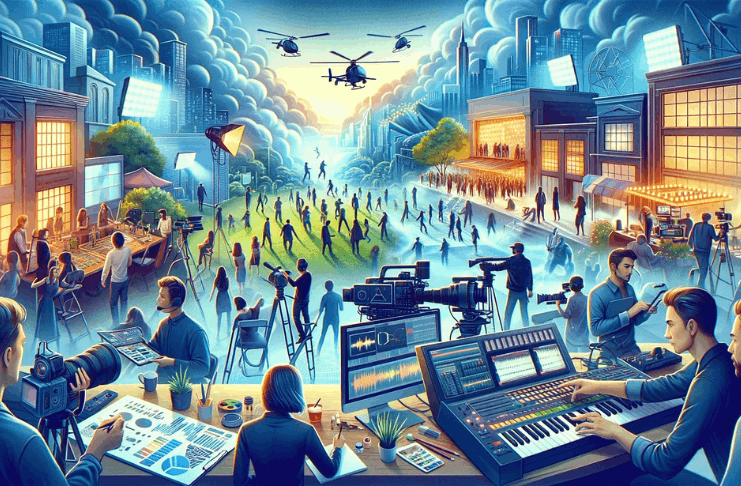Delve into 25 beginner-friendly roles in media and entertainment, spanning production and content creation, as you embark on your career journey.
Uncover your niche in this dynamic industry and pursue your passion with confidence.
Defining Media and Entertainment Careers
Media and entertainment careers involve creating, delivering, and showcasing content across mediums like film, television, music, and digital media.
These careers collectively shape how society consumes and experiences entertainment in today’s rapidly evolving media landscape.
The Benefits of Starting in Media and Entertainment
Starting in media and entertainment offers benefits such as:
- Creativity and Innovation: You can unleash your creativity and innovate.
- Diverse Career Paths: Various roles allow exploration.
- Fast-Paced Environment: Work in a dynamic setting.
- Global Reach: Reach worldwide audiences.
- Networking Opportunities: Connect with industry professionals.
- Personal Growth: Adapt and grow.
- Impact and Influence: Inspire through creativity.
- Continuous Learning: Evolve with the industry.
- Potential for Recognition: Gain recognition and awards.
- Fulfillment: Bring entertainment and information to audiences.

List of 25 Entry-Level Media and Entertainment Roles
Exploring careers in media and entertainment reveals a diverse array of entry-level roles.
Below, these roles are grouped into categories, each briefly described:
Film and Television
- Production Assistant: Assist in film and TV production.
- Script Reader: Review and assess scripts.
- Camera Operator: Operates cameras for filming.
- Video Editor: Edit video content.
- Set Designer: Create sets for productions.
Music Industry
- Music Technician: Set up and maintain equipment.
- Booking Agent: Secure gigs for artists.
- A&R Assistant: Assist in artist development.
- Sound Engineer: Ensure quality sound in recordings.
- Tour Manager: Organize and manage tours.
Journalism and Writing
- Copywriter: Write content for various media.
- News Reporter: Cover current events and stories.
- Content Editor: Edit and curate content.
- Social Media Manager: Manage online presence.
- Public Relations Assistant: Assist with PR campaigns.
Digital Media and Marketing
- Content Creator: Produce digital content.
- SEO Specialist: Optimize online content.
- Digital Marketing Assistant: Support marketing efforts.
- Data Analyst: Analyze audience data.
- Email Marketing Coordinator: Manage email campaigns.
Radio Broadcasting
- Radio Host: Present radio shows.
- Producer: Oversee radio show production.
- Radio Sales Assistant: Support advertising sales.
- Audio Engineer: Ensure quality sound.
- Program Director: Manage radio programming.
Qualifications and Skills
Qualifications and skills are vital when pursuing a career in media and entertainment. Here are the typical qualifications and essential skills required:
Qualifications
- Education: A relevant degree or diploma in the chosen field, such as film, journalism, or marketing.
- Certifications: Industry-specific certifications can boost your credibility.
- Internships: Practical experience gained through internships is valuable.
- Portfolio: A strong portfolio showcasing your work is often necessary.
Skills
- Communication: Excellent written and verbal communication skills are essential.
- Creativity: The ability to think creatively and generate innovative ideas.
- Technical Proficiency: Familiarity with relevant software and equipment.
- Adaptability: The capacity to adapt to industry trends and changes.
- Teamwork: Collaboration and working well with others.
- Time Management: Effective time and project management.
- Problem-Solving: Critical thinking and problem-solving abilities.
- Networking: Building and maintaining professional relationships.
- Attention to Detail: Precision and thoroughness in work.
- Marketing and Promotion: Understanding audience engagement and promotion strategies.
How to Start Your Media and Entertainment Career
It’s crucial to know how to apply for positions effectively to embark on a career in media and entertainment.
Here’s a step-by-step guide on how to navigate the application process:
- Identify Your Interests: Determine which specific role or area within media and entertainment aligns with your skills and passion.
- Research Companies: Explore organizations, studios, networks, or agencies that offer opportunities in your chosen field.
- Create a Strong Resume: Craft a well-structured resume highlighting your qualifications, skills, and relevant experience.
- Build a Portfolio: Assemble a portfolio showcasing your work, whether writing samples, video projects, or creative content.
- Network: Connect with professionals in the industry through social media, industry events, and informational interviews.
- Search Job Listings: Look for job openings on company websites, job boards, and industry-specific platforms.
- Customize Your Applications: Tailor your cover letter and resume for each application, emphasizing your suitability for the role.
- Prepare for Interviews: Practice common interview questions and prepare examples of your accomplishments and skills.
- Follow Up: After applying or interviewing, send a thank-you email expressing your interest and gratitude for the opportunity.
- Stay Persistent: In a competitive job market, keep applying, networking, and honing your skills to boost your chances of success.

Tips for Landing Your First Job
Securing your first job in the media and entertainment industry can be a rewarding experience with the right approach.
Here are some valuable tips to help you land that crucial initial position:
- Customize Your Resume: Tailor it to match job requirements.
- Network Actively: Attend industry events and connect with professionals.
- Consider Internships: Gain practical experience and network.
- Maintain an Online Presence: Use LinkedIn for professionalism.
- Research Companies: Learn about their culture before interviews.
- Prepare for Interviews: Practice common questions and prepare examples.
- Follow Up: Send a thank-you email after interviews.
- Seek Feedback: Request feedback to improve future prospects.
Perks and Advantages of a Media and Entertainment Career
Media and entertainment careers come with exciting perks and benefits. Here are some advantages:
- Creativity Unleashed: The freedom to express your creativity and innovate in your work.
- Diverse Career Paths: A wide array of industry roles and fields to explore.
- Dynamic Environment: Work in a fast-paced and ever-evolving industry.
- Global Impact: The opportunity to reach and influence a global audience.
- Networking Opportunities: Connections with industry professionals and peers.
- Personal Growth: Constant learning and adaptation to new challenges.
- Influence and Inspiration: The ability to inspire others through your creative contributions.
- Continuous Learning: Opportunities for skill development and growth.
- Recognition and Awards: The possibility of receiving recognition for your work.
- Fulfillment: The satisfaction of bringing entertainment and information to audiences.
Media and Entertainment Career Salary Ranges: What to Expect
Knowing salary ranges in media and entertainment is crucial for career planning. Here are approximate ranges for typical roles in the industry:
Film and Television
- Production Assistant: $25,000 – $45,000 per year
- Script Reader: $30,000 – $60,000 per year
- Camera Operator: $35,000 – $75,000 per year
- Video Editor: $40,000 – $80,000 per year
- Set Designer: $45,000 – $85,000 per year
Music Industry
- Booking Agent: $35,000 – $70,000 per year
- A&R Assistant: $40,000 – $75,000 per year
- Sound Engineer: $45,000 – $85,000 per year
- Tour Manager: $50,000 – $90,000 per year
- Music Technician: $30,000 – $60,000 per year
Journalism and Writing
- News Reporter: $40,000 – $80,000 per year
- Content Editor: $45,000 – $85,000 per year
- Social Media Manager: $50,000 – $90,000 per year
- Public Relations Assistant: $35,000 – $70,000 per year
- Copywriter: $35,000 – $70,000 per year
Digital Media and Marketing
- SEO Specialist: $40,000 – $80,000 per year
- Digital Marketing Assistant: $45,000 – $85,000 per year
- Data Analyst: $50,000 – $90,000 per year
- Email Marketing Coordinator: $35,000 – $70,000 per year
- Content Creator: $35,000 – $75,000 per year
Radio Broadcasting
- Producer: $40,000 – $80,000 per year
- Radio Sales Assistant: $45,000 – $85,000 per year
- Audio Engineer: $50,000 – $90,000 per year
- Program Director: $60,000 – $100,000+ per year
- Radio Host: $35,000 – $70,000 per year
Please note that these approximate salary ranges can vary based on location, experience, and the specific employer.
The Bottomline
In conclusion, a career in media and entertainment offers diverse opportunities for creativity and innovation.
With various roles and global impact potential, it’s a dynamic and fulfilling path in a rapidly evolving landscape.
Embrace the opportunities, keep learning, and make your mark in this exciting industry.